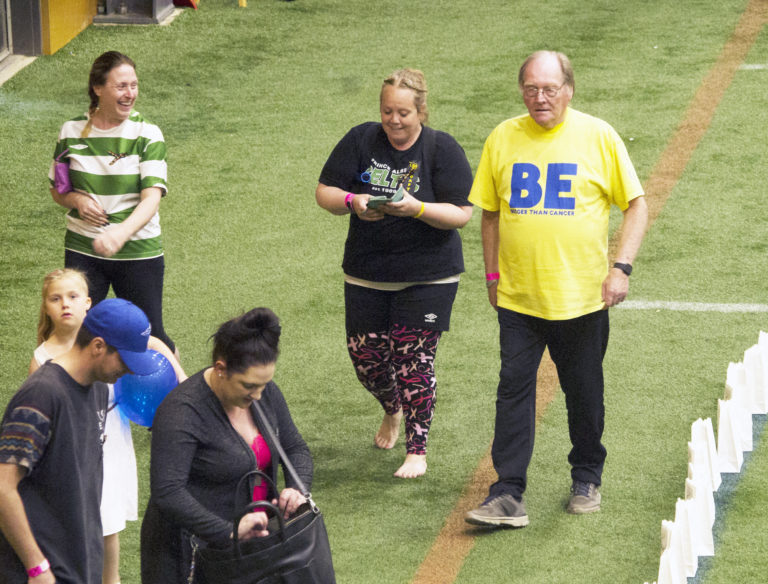
Terry Sollis always joked that he’d die on the soccer field.
He spent 68 years playing, coaching, and refereeing, all while cheering on his favourite club: Liverpool FC. But in Februrary 2016, it looked like that might change for the first time in his life. His doctor delivered the bad news following an ultrasound. Sollis had cancer.
“It was something I don’t think anybody wants to hear,” he remembers. “I, at first, was in denial. This is not happening to me. It can’t be.”
What followed was three years of treatment, including one surgery to remove the tumor. Sollis describes that first month and a half after the surgery as extremely hard. At times he felt like giving up. It was only through the positive support and encouragement of those around him—particularly his doctor—that he pulled through.
Today he’s happy, healthy and still coaching soccer. He’s also, as of last March, completely cancer free.
“You really can’t explain how you feel,” says Sollis, who moved from England to Canada in 1974. “I’m still basically coming down. Even now, months later, I am still coming down. It’s an amazing feeling.”
With his health restored, Sollis and his soccer team are putting their free time to good use. Today he’s one of numerous cancer survivors walking laps at Prince Albert’s Relay for Life event, although he’s the only survivor accompanied by a group of teenagers in green and white striped Prince Albert Celtics soccer jerseys.
One of Sollis’ players even agrees to have his head shaved as part of a cancer research fundraiser. The team has already challenged Sollis to join them.
“I’m a rebel and I grow my hair long, but I got it cut a couple of months ago,” he chuckles. “Now they’ve told me to grow it again and get shaved next year. They’ve already challenged me.””
Sollis’ story has a happy ending, but for many of the people walking at the 2019 Relay for Life, that isn’t the case.
Judy Holland has seen both sides. Her husband was diagnosed with cancer in 2013. In 2016, it was her mother.
Holland’s husband is now cancer free. Her mother died in January 2018.
“It’s hard,” Holland said shortly after walking the caregiver’s lap with her relatives. “I was with my mom when she got diagnosed and it was hard.”
In 2016, Holland, her mother and her family were initially optimistic. She had a few female relatives who had been beaten breast cancer, and Holland hoped her mother could do the same. Unfortunately, her mother’s case was so severe it required experimental treatments.
“None of them really worked,” Holland says.
Even when treatments do work, they can take a tremendous toll on the patient. Holland’s husband lost 30 pounds during the process, and another 20 after it was done.
The most difficult part was the travel. At the time, Holland and her husband lived roughly 25-minutes north of Prince Albert, but had to drive to Saskatoon daily for treatment.
“We started on Nov. 25 and finished on Jan. 15, driving every day, Monday to Friday, except for holidays and weekends,” she remembers. “It’s pretty arduous. He is cancer free for the last five years. We’re hoping it stays that way.”
Things were different when Holland’s mother received her diagnosis. By that time, the chemotherapy program (COPS) was easily accessible at Victoria Hospital in Prince Albert, and various programs were popping up that gave cancer patients a place to stay when travelling to Saskatoon.
Holland described the COPS facility as a “godsend” for the family, but as the years go by, she worries about rural and northern families who have the same problems her husband did: isolation.
“Things have gotten better, but I’m not sure how the more remote communities feel,” she says.
While Holland, her sisters, and the rest of the family make it a priority to support Relay for Life, she’s disappointed to see a drop in support. Organizers were forced to move this year’s event to the Alfred Jenkins Fieldhouse on short notice due to weather concerns, for Holland that’s no excuse. Cancer has touched everyone, she says, and those people should take a day out of their lives to offer their support.
“I participated when there was up to 40 teams,” she says. “I’m not sure why there’s a decline. I’d like to see more people coming out. It’s a good event and they have awesome organizers. You couldn’t ask for better. They switched to this venue and it’s great. I think people should just make a little time. It’s only a day of their life.”
